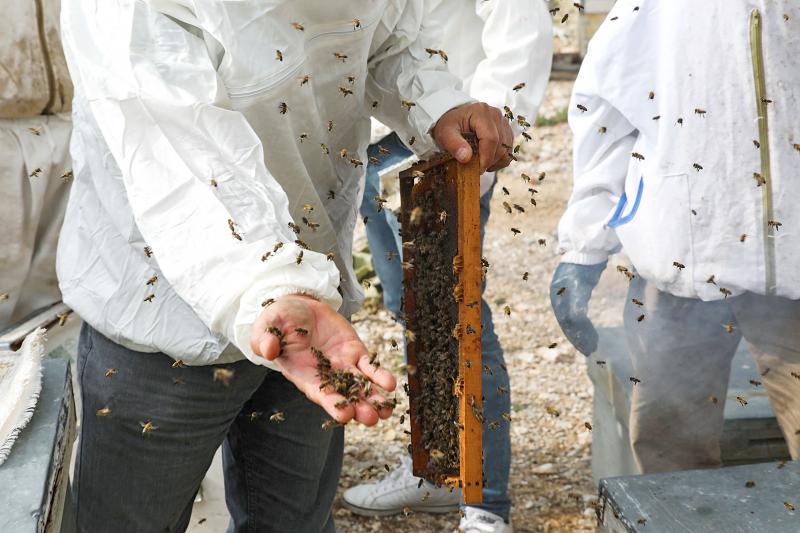Beekeepers Mustafa Alti and his son Fehmi were kept busy tending to their hives before wildfires tore through a bucolic region of Turkey that makes most of the world’s prized pine honey.
Now the Altis and generations of other honey farmers in Turkey’s Aegean province of Mugla are scrambling to find additional work and wondering how many decades it might take to get their old lives back on track.
“Our means of existence is from beekeeping, but when the forests burned, our source of income fell,” said Fehmi, 47, next to his mountainside beehives in the fire-ravaged village of Cokek. “I do side jobs, I do some tree felling, that way we manage to make do.”

Photo: AFP
Nearly 200,000 hectares of forests — more than five times the annual average — were scorched by fires across Turkey this year, turning luscious green coasts popular with tourists into ash.
The summer disaster and an accompanying series of deadly floods made the climate — already weighing heavily on the minds of younger voters — a major issue two years before the next scheduled election.
Signaling a political shift, Turkey’s parliament last week ended a five-year wait and ratified the Paris Agreement on cutting the greenhouse emissions that are blamed for global warming and abnormal weather events.
However, the damage has already been done in Mugla, where 80 percent of Turkey’s pine honey is produced.
Turkey as a whole makes 92 percent of the world’s pine honey, meaning supplies of the thick, dark amber might be running low worldwide very soon.
Turkey’s pine honey harvests were already suffering from drought when the wildfires hit, destroying the delicate balance between bees, trees and the little insects at the heart of the production process.
The honey is made by bees after they collect the sugary secretions of the tiny Basra beetle (Marchalina hellenica), which lives on the sap of pine trees.
Fehmi hopes the beetles will adapt to younger trees after the fires, but he also accepts that “it will take at least five or 10 years to get our previous income back.”
His father, Mustafa, agrees, urging Turkish President Recep Tayyip Erdogan’s government to expand forested areas and plant young trees.
“There’s no fixing a burnt house. Can you fix the dead? No, but new trees might come, a new generation,” Mustafa said.
For now, though, the beekeepers are counting their losses and figuring out what comes next.
Mugla Beekeepers’ Association president Veli Turk expects his region’s honey production to plunge by up to 95 percent this year.
“There is pretty much no Marmaris honey left,” he said.
“This honey won’t come for another 60 years,” he said. “It’s not just Turkey. This honey would go everywhere in the world. It was a blessing. This is really a huge loss.”
Beekeeper Yasar Karayigit, 45, is thinking of switching to a different type of honey to keep his passion — and sole source of income — alive.
“I love beekeeping, but to continue, I’ll have to pursue alternatives,” Karayigit said, mentioning royal jelly (or “bee milk”) and sunflower honey, which involves additional costs.
“But if we love the bees, we have to do this,” the father-of-three said.
Ismail Atici, head of the Milas district Chamber of Agriculture in Mugla, said the price of pine honey has doubled from last year, threatening to make the popular breakfast food unaffordable for many Turks.
He expects price rises to continue and supplies to become ever more scarce.
“We will get to a point where even if you have money, you won’t be able to find those medicinal plants and medicinal honey,” Atici said.
Turkey Beekeepers’ Association president Ziya Sahin suggests selectively introducing the Basra beetle to new areas of Mugla, expanding coverage from the current 7 percent to 25 percent of local pine forests.
“If we conduct transplantation of the beetle from one area to another and continue this for two successive years, we can protect the region’s dominance in the sector,” Sahin said.
“There will be a serious drop in honey production if we don’t do this,” he added, calling this year the “worst” of his 50-year career.
Yet despite the pain and the troubled road ahead, the younger Alti has no plans to quit.
“This is my father’s trade. Because this is passed down from the family, we must continue it,” Fehmi said.

TRUMP EFFECT: The win capped one of the most dramatic turnarounds in Canadian political history after the Conservatives had led the Liberals by more than 20 points Canadian Prime Minister Mark Carney yesterday pledged to win US President Donald Trump’s trade war after winning Canada’s election and leading his Liberal Party to another term in power. Following a campaign dominated by Trump’s tariffs and annexation threats, Carney promised to chart “a new path forward” in a world “fundamentally changed” by a US that is newly hostile to free trade. “We are over the shock of the American betrayal, but we should never forget the lessons,” said Carney, who led the central banks of Canada and the UK before entering politics earlier this year. “We will win this trade war and

Kehinde Sanni spends his days smoothing out dents and repainting scratched bumpers in a modest autobody shop in Lagos. He has never left Nigeria, yet he speaks glowingly of Burkina Faso military leader Ibrahim Traore. “Nigeria needs someone like Ibrahim Traore of Burkina Faso. He is doing well for his country,” Sanni said. His admiration is shaped by a steady stream of viral videos, memes and social media posts — many misleading or outright false — portraying Traore as a fearless reformer who defied Western powers and reclaimed his country’s dignity. The Burkinabe strongman swept into power following a coup in September 2022

‘BODIES EVERYWHERE’: The incident occurred at a Filipino festival celebrating an anti-colonial leader, with the driver described as a ‘lone suspect’ known to police Canadian police arrested a man on Saturday after a car plowed into a street party in the western Canadian city of Vancouver, killing a number of people. Authorities said the incident happened shortly after 8pm in Vancouver’s Sunset on Fraser neighborhood as members of the Filipino community gathered to celebrate Lapu Lapu Day. The festival, which commemorates a Filipino anti-colonial leader from the 16th century, falls this year on the weekend before Canada’s election. A 30-year-old local man was arrested at the scene, Vancouver police wrote on X. The driver was a “lone suspect” known to police, a police spokesperson told journalists at the

North Korean leader Kim Jong-un has unveiled a new naval destroyer, claiming it as a significant advancement toward his goal of expanding the operational range and preemptive strike capabilities of his nuclear-armed military, state media said yesterday. North Korea’s state-run Korean Central News Agency (KCNA) said Kim attended the launching ceremony for the 5,000-tonne warship on Friday at the western port of Nampo. Kim framed the arms buildup as a response to perceived threats from the US and its allies in Asia, who have been expanding joint military exercises amid rising tensions over the North’s nuclear program. He added that the acquisition